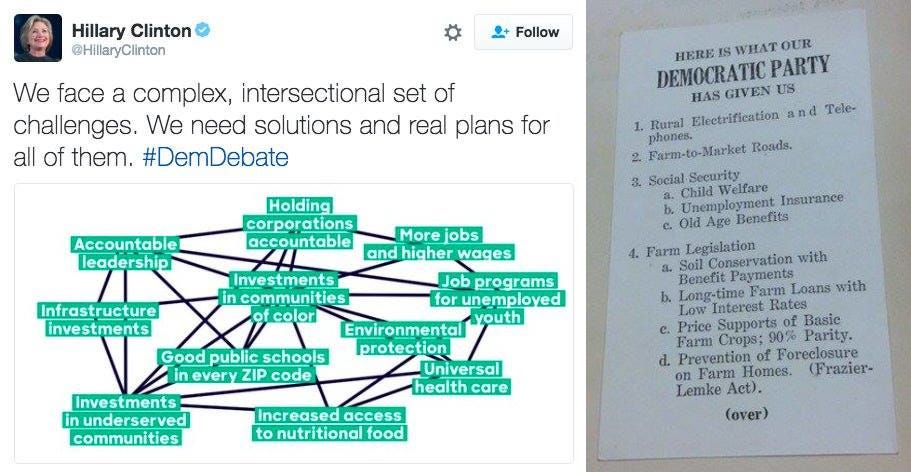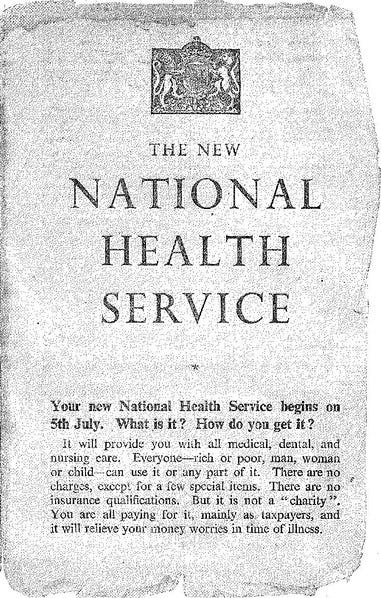Simple Statements of Values That Highlight the Popular and Material Consequences of Our Agenda and Stress Shared Need and Universalism
I've been saying this stuff publicly for 15 years
Of course my NYT piece from this morning has resulted in a lot of people asking me, “well what’s your plan?” Which is strange because I publish like 10,000 words a week, a lot of them that reflect on my plan. But, fine. You see those images up above? That’s my plan - to do what the image on the right does, not what the image on the left does.
Simplicity - The individual wordings in the Hillary tweet are actually fine. But why oh why would you draw that absurd diagram, which makes the message here seem vastly more complicated than it has to be? What on earth is the word “intersectional” doing in a tweet from a presidential candidate during a campaign? Intersectional is a word that should never, ever be used by Democratic candidates for office in public messaging. It sounds like the unnecessary academic jargon it is. The trouble is that so much of left-of-center messaging is directed at insiders rather than average people; you get credit for saying “intersectional” within liberal enclaves and so it pops up again and again where it’s not needed. How about just tweeting out each of those individual statements in the diagram there over time?
Values - I think the CRT fight is not worth it, even while I recognize how duplicitous Republicans have been. But if you must fight it, fight it by stating your values. “We need accountability in our portrayal of history, which teaches children about slavery and racism and stresses how we have more work to do to achieve racial justice.” Is that what liberals did? No. They spent the whole debate complaining about the debate. It was a meta-debate the whole time. Whining that the other side is cheating doesn’t make your party or ideology look good! Chris Rufo was out there saying “they’re teaching our children that white people are evil.” The default liberal response was to say, in a sneering tone, “you idiots, CRT is only found in the most august heights of academia!” You just can’t win that way. Far better: “No, we’re teaching children that all of us have a part to play in healing our country’s racial wounds, and to do that we need to help them understand how destructive slavery and Jim Crow were.” Maybe you lose saying that. But you lose by defining your values. The only message I took from liberal responses to the CRT hysteria was that it wasn’t faaaaaaaaaiiiiiiiiiirrrrrrrr.
Popular - Really incredible that this became so controversial in the popularist debate, but the dirty secret of politics is that if you get elected for saying popular things you can also try and slip in the unpopular things when you’re in power. In contrast if you don’t say popular things you lose elections and never even get the change to try and slip in the unpopular things. Crazy, I know.
Material - This is maybe a corollary of the last. People want help with the stuff that actually hurts them in their lives, things like being unable to pay the rent, struggling to find doctors who take their insurance, sending children to schools with broken HVAC systems, suffering from crime, suffering from corrupt or brutal police officers, and on and on. And the smart thing to do is to keep referring back to these material needs and our proposed solutions to them. Medicare is really popular. Social Security is really popular. It might surprise you that food stamps, the kind of “government handout” that people think voters hate, are pretty popular. That’s because they give people real things that they really need. You can win those fights. When, on the other hand, we fight over the 1619 Project (which I don’t care about either way substantively), we’re spending political resources on a completely abstract debate, a symbolic debate. When liberals fight over the right euphemisms to use for the right groups, rather than proposing or defending programs and laws that protect those groups, you’re losing the battle. When left-of-center types insist on using abstruse vocabulary in spaces like local school boards, they’re losing the battle. You can do all the intellectualizing (like I do) in the right spaces, but keep it out of campaigns. What can we do for people that helps their material self-interest? Are we clothing them, keeping them warm, getting them medicine, helping pay the bills? Start there.
Shared Need - Selflessness is a wonderful quality in human beings, and human life would be awful without it. But selflessness is not and cannot be the basis of our politics. People vote based on their needs and the needs of their families, as well they should. The key maneuver for the left is to help people understand that they share needs with their neighbors, all of the neighbors, from across different races and genders and religions and so on. “Hey, I know it may seem like the Black family across town has nothing to do with you, but they’re frustrated by the potholes and unresponsive local government too.” You found points that connect people in their selfish needs, and that’s not hard because a lot of society’s problems are shared by everyone. (Well, everyone but the rich.) And if you’d like to accuse me of advancing a reactionary sentiment here, ask Marx:
Communism is quite incomprehensible to [the anarchist and individualist Max Stirner] because the communists do not oppose egoism to selflessness or selflessness to egoism, nor do they express this contradiction theoretically either in its sentimental or in its high-flown ideological form; they rather demonstrate its material source, with which it disappears of itself. The communists do not preach morality at all, as Stirner does so extensively. They do not put to people the moral demand: love one another, do not be egoists, etc.; on the contrary, they are very well aware that egoism, just as much as selflessness, is in definite circumstances a necessary form of the self-assertion of individuals. Hence, the communists by no means want…to do away with the ‘private individual’ for the sake of the ‘general,’ selfless man.
Universalism - You know what the most basic political message is? “Your problems are real, and you deserve help.” That may sound like an inherently left-wing message, but I don’t think it is. A conservative might say “You’re right, your taxes are way too high, and you need representation in Congress that will fight for relief.” But the most important part of that basic message is, as it always is in politics, you. People have to hear that you, as a politician or activist, are including them in your concerns. And the left-of-center just sucks at this, in this country, so so much. Everything we say seems tailored to some group, some identity category, which inevitably leaves a lot of other people out. That’s just bad politics, especially given that 70% of the electorate is white and thus the Republicans can target them and still win elections. (And voters of color have even been trending GOP for several federal elections now….) This is maybe the one real pain point of what I’m saying here: the constant demands to “center” this group or that are really destructive. You can’t do politics that way. But what you can do is speak to and for everyone in a campaign, then when you’re elected enacted fair and sound policy that addresses the needs of disadvantaged groups. It’s not a matter of not caring about identity groups. It’s a matter of caring about them so much that you do what it takes to achieve the power you need to help them.
That’s it, that’s the basics of how I think politics should be waged by the left. I understand that this is not a policy proposal, but I’m sure I’ll get to that soon enough. Until then, this will have to suffice - tell them what you’re doing for them and will do for them, in simple terms. Like this.





“ When, on the other hand, we fight over the 1619 Project”
I’m not into conspiracy theories. But if I was part of a billionaire cabal trying to divert attention away from our looting and pillaging - the whole 1619/CRT would probably be what my highly paid team came up with.
Hi Freddie: I really enjoy your work and am happy to subscribe to the substack. This claim, "People vote based on their needs and the needs of their families, as well they should," is, I believe, not true (the first, empirical clause, not commenting on the normative clause). Check out "Sociotropic Politics: The American Case" by Donald R. Kinder and D. Roderick Kiewiet and its progeny if you're interested in digging into the empirical literature on this.